PostgreSQL to Looker Studio Integration
Use Coupler.io to connect PostgreSQL to Looker Studio for automated reporting. No coding is required to prepare data for Looker Studio and make it analysis-ready. Use pre-built dashboard templates to get deeper insights into your PostgreSQL data.
Connect PostgreSQL to Looker Studio with Coupler.io to simplify reporting
Get and prepare data effortlessly
Take advantage of the no-code data transformation and organization modules for the PostgreSQL to Looker Studio integration. Combine data from different sources with Coupler.io’s reliable connectors. Enjoy the outstanding support for the excellence of your data pipelines.
Automate reporting tasks
Link PostgreSQL to Looker Studio to automate your reporting routine. You won’t need to manually copy and paste data to populate your Looker Studio reports. Instead, enjoy the ready-to-use dashboards to drive fast and accurate insights.
Stand out as a data-driven expert
Impress your stakeholders with a top-notch report that presents business outcomes in a clear and digestible manner. Use the obtained insights for your strategic planning and business development. Spend the saved time on generating new ideas and campaigns.
How to integrate PostgreSQL to Looker Studio (detailed guide)
With Coupler.io, you can automate data collection with the no-code PostgreSQL to Looker Studio integration and use a pre-built module for data transformation.
Make sure you have a Coupler.io account. Then, create an importer and select these services on the source and destination drop-down list. Afterward, all you have to do is follow the guidelines provided below. Ensure that the setup process to export PostgreSQL to Looker Studio will take just several minutes!
Step 1: Collect data
On the source settings screen, you will need to indicate all the requested details about your PostgreSQL account. This is necessary to authorize access to your database and give Coupler.io permission to read data.
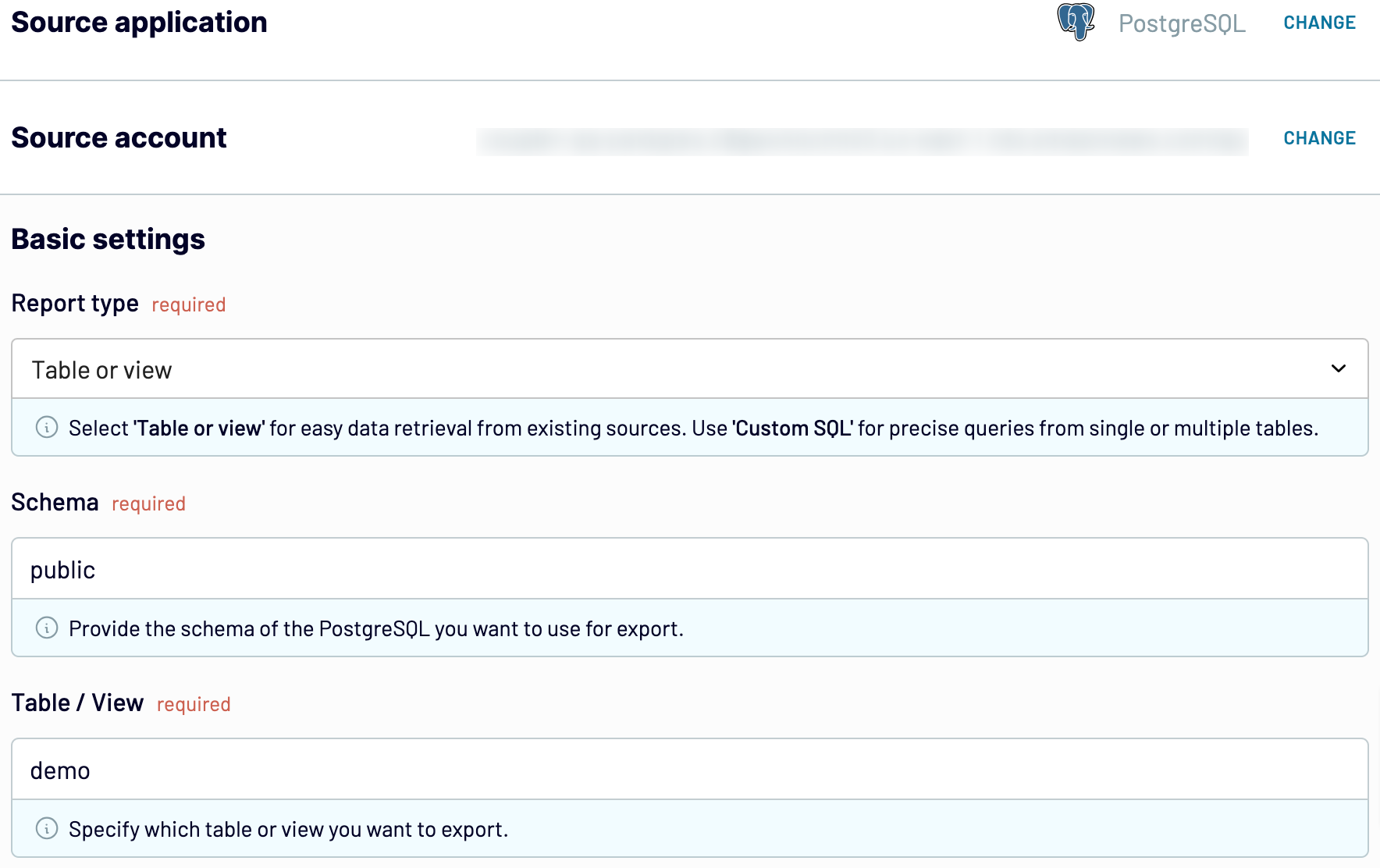
Make sure that all the required fields are filled in. Check the source settings once again and proceed to the Transformation tab.
Step 2: Organize and transform
Before you import data from PostgreSQL to Looker Studio, it’s a good practice to prepare it beforehand. Inspect your data in the preview window, and see what should be omitted or maybe something needs to be added. Decide which of the Coupler.io’s options you want to use for data organization and transformation:
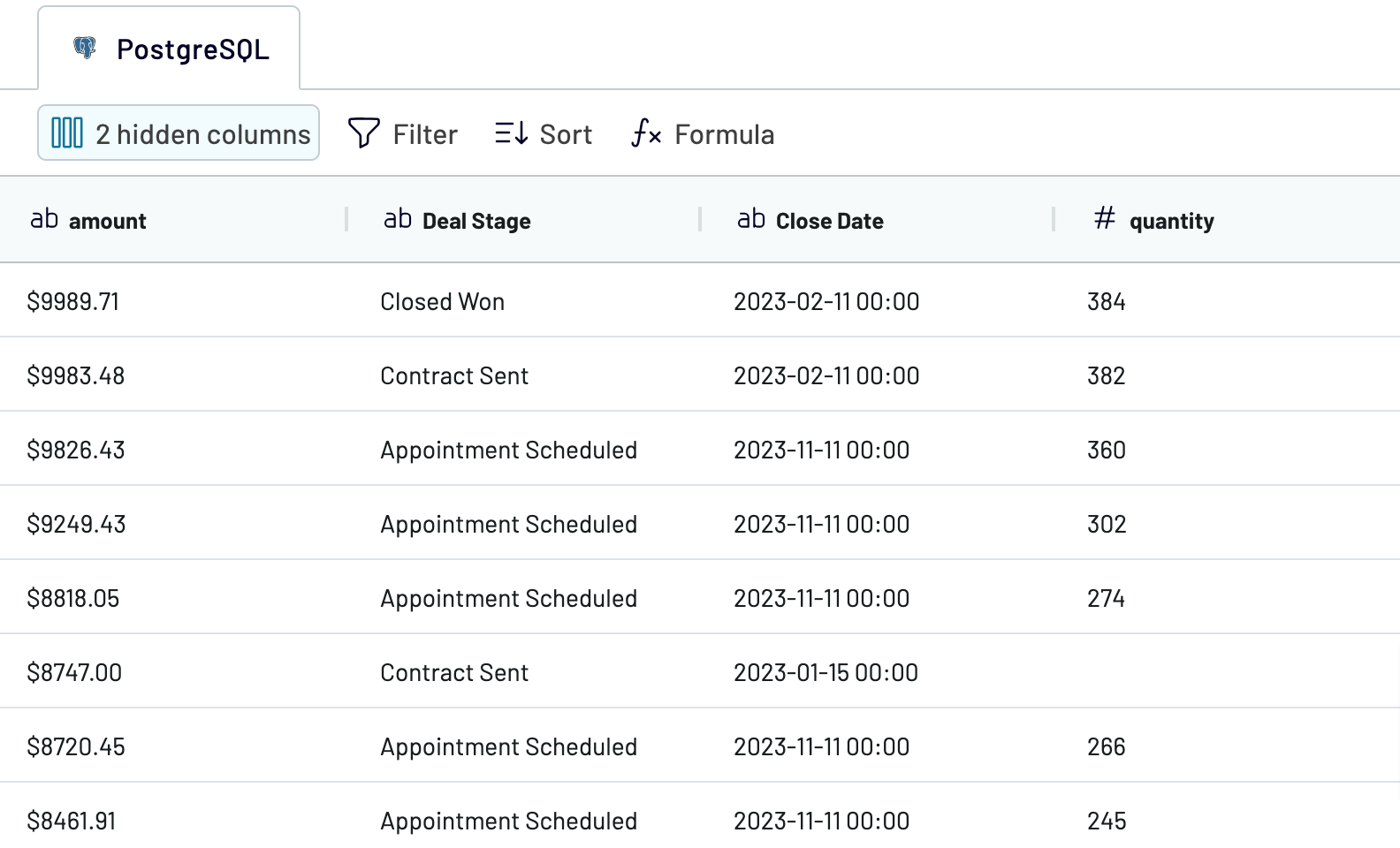
Once you like the way your dataset looks, go to the Destination tab.
Step 3: Load and schedule refresh
The last step of the integration setup is to configure the destination. Click Generate Data Source and connect to your Looker Studio account. Follow further on-screen instructions to create a report.
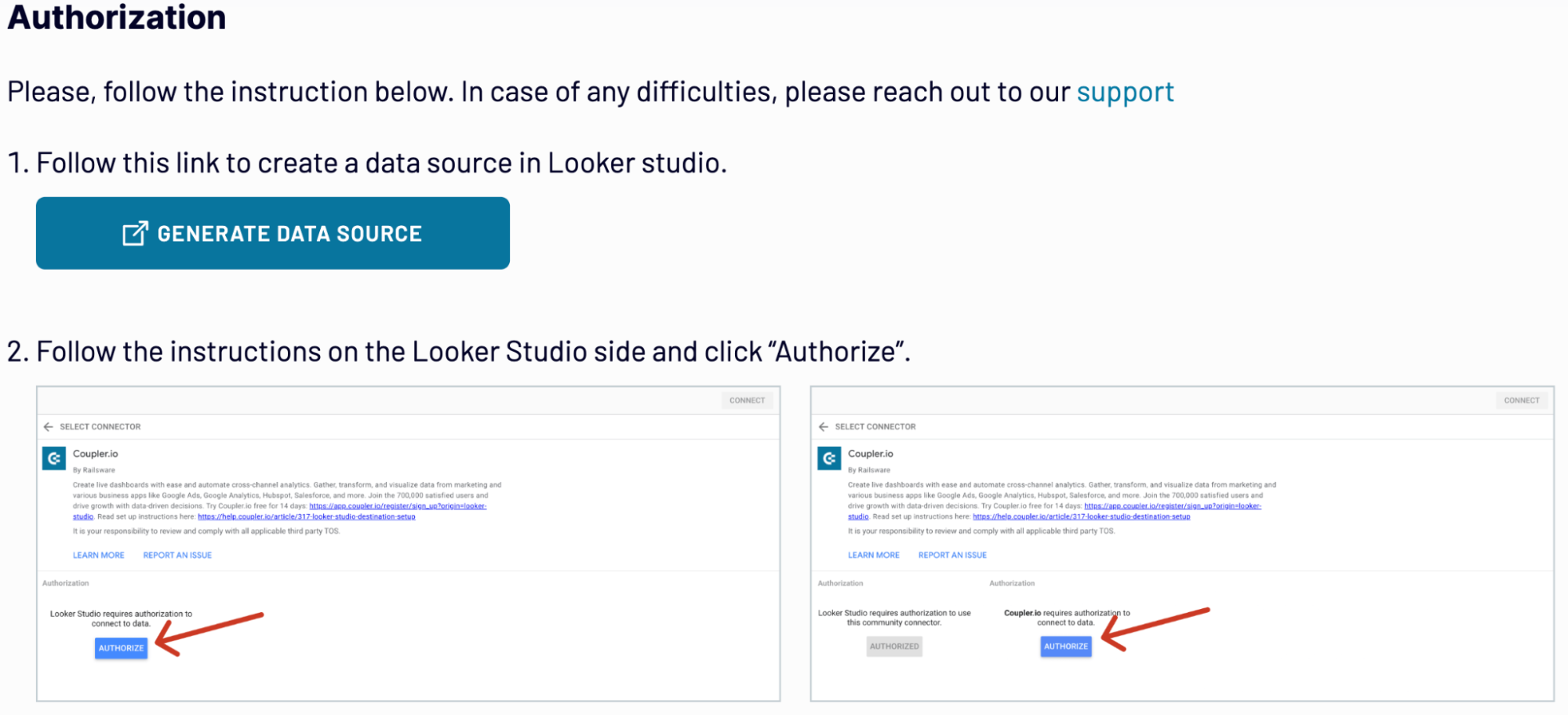
Decide whether you want to make a one-time report. If so, save the importer and click Run. Otherwise, set up the automatic data refresh for regular data updates for Looker Studio reports.
Make sure you have a Coupler.io account. Then, create an importer and select these services on the source and destination drop-down list. Afterward, all you have to do is follow the guidelines provided below. Ensure that the setup process to export PostgreSQL to Looker Studio will take just several minutes!
Step 1: Collect data
On the source settings screen, you will need to indicate all the requested details about your PostgreSQL account. This is necessary to authorize access to your database and give Coupler.io permission to read data.
- Report type. Select the table or view for easy data retrieval. Otherwise, write custom SQL queries to extract data from different PostgreSQL tables.
- Schema. Specify the schema you want to export.
- Table/view. Provide the name of the table or view from which you'd like to load data.

Make sure that all the required fields are filled in. Check the source settings once again and proceed to the Transformation tab.
Step 2: Organize and transform
Before you import data from PostgreSQL to Looker Studio, it’s a good practice to prepare it beforehand. Inspect your data in the preview window, and see what should be omitted or maybe something needs to be added. Decide which of the Coupler.io’s options you want to use for data organization and transformation:
- Edit, rearrange, hide, or add columns.
- Apply various filters and sort your data.
- Create new columns based on custom formulas.
- Blend data from multiple accounts or apps.

Once you like the way your dataset looks, go to the Destination tab.
Step 3: Load and schedule refresh
The last step of the integration setup is to configure the destination. Click Generate Data Source and connect to your Looker Studio account. Follow further on-screen instructions to create a report.

Decide whether you want to make a one-time report. If so, save the importer and click Run. Otherwise, set up the automatic data refresh for regular data updates for Looker Studio reports.
Export PostgreSQL to Looker Studio on a schedule
Regular data export from PostgreSQL to Looker Studio is fundamental for quality reporting. Thanks to Coupler.io's regular data refreshment, you can keep your reports always up-to-date. Select the data refresh frequency or set the exact times for updates. The available intervals range between 15 minutes to one month. With Coupler.io, get the latest reports to enhance your decision-making and strategic planning.


Export data from PostgreSQL to alternative destinations
Quick start with dashboard templates
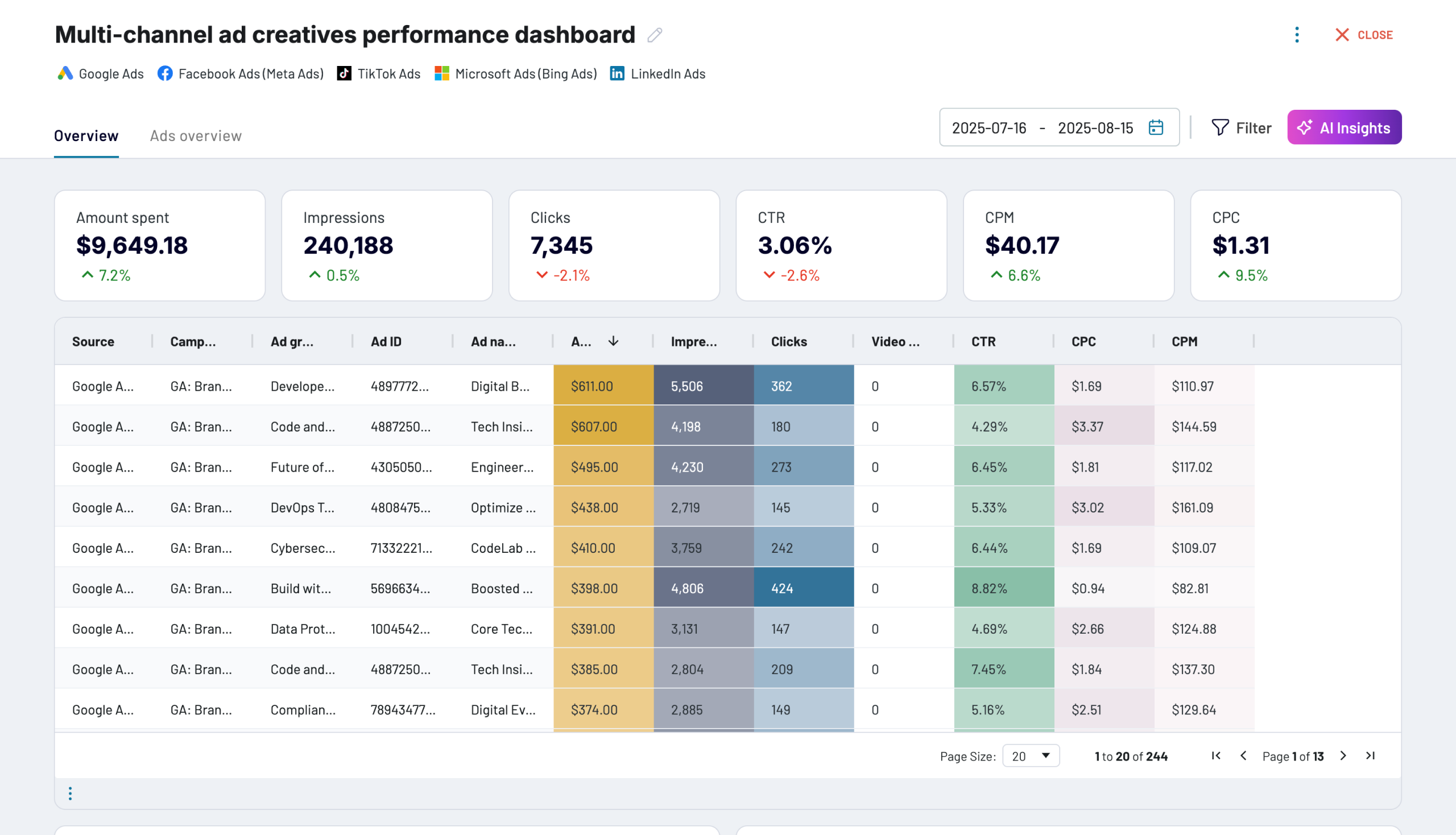
Multi-channel ad creatives performance dashboard






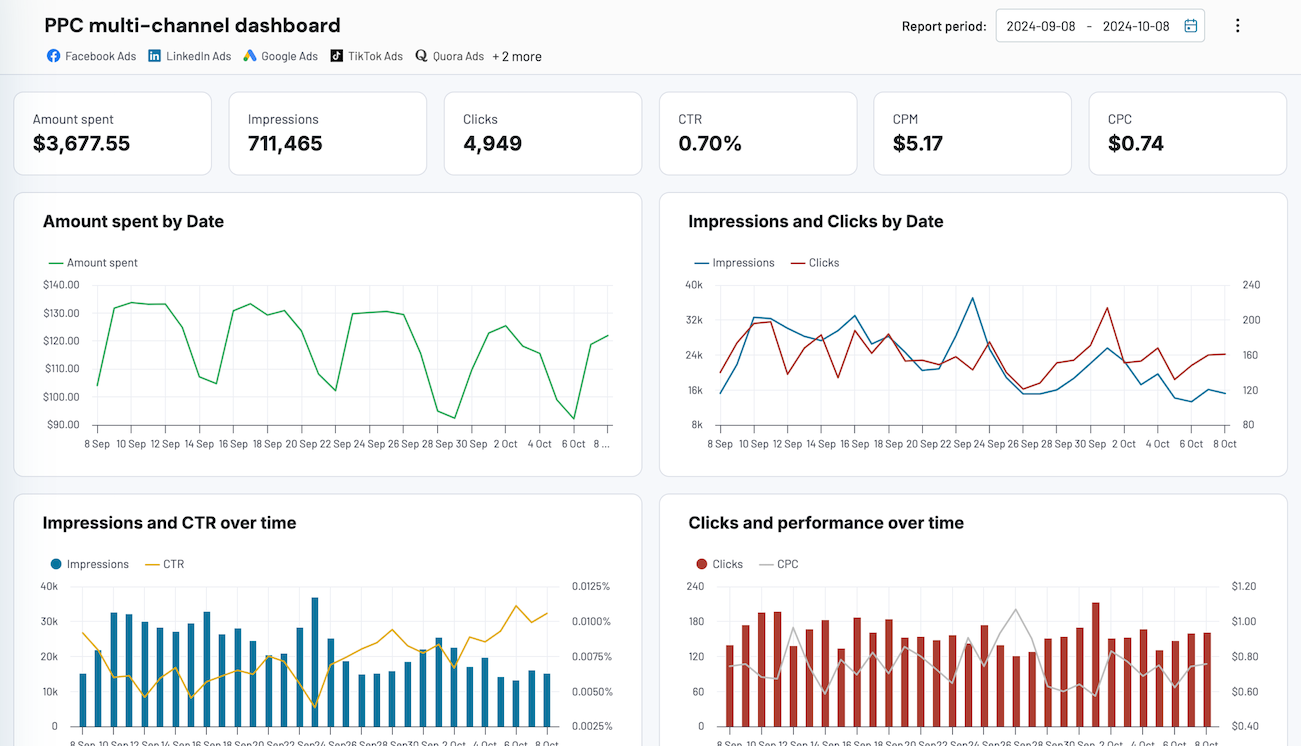
PPC multi-channel dashboard






 +3
+3

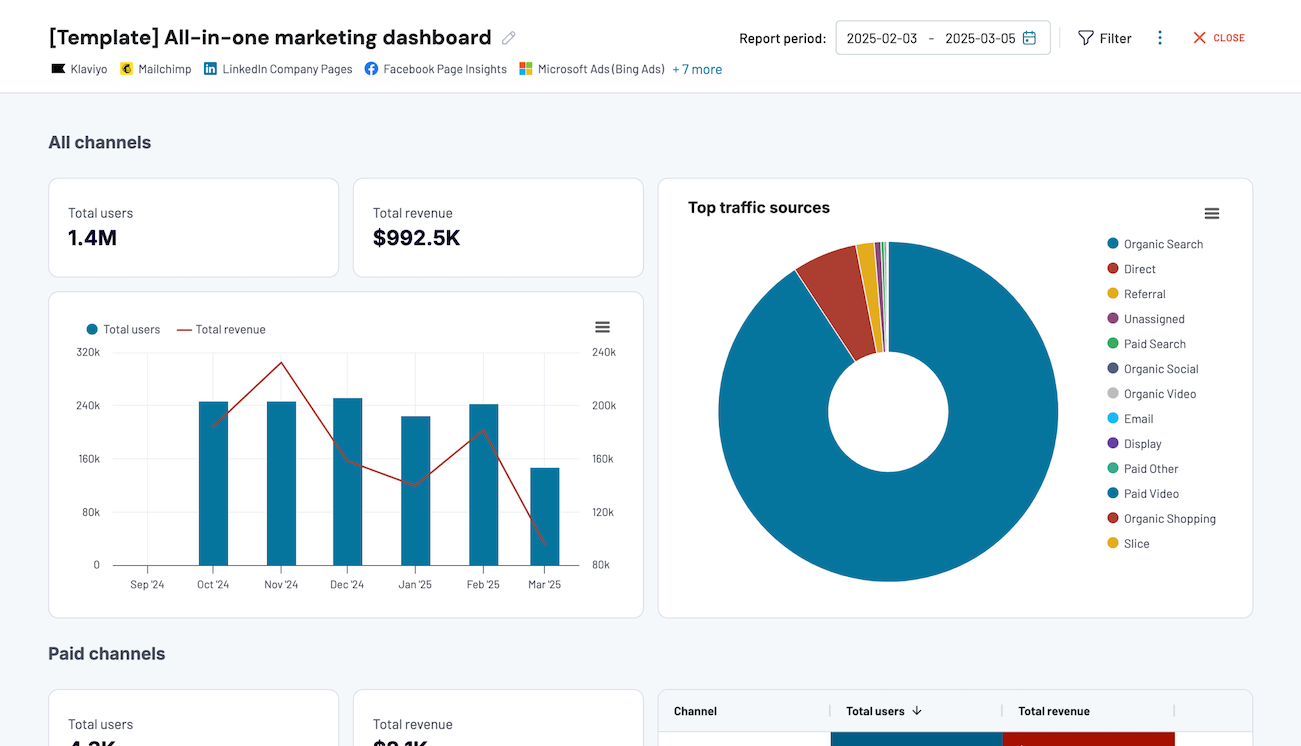
All-in-one marketing dashboard






 +6
+6

No such template is available yet.
No worries. Our team will create a template that fits your needs, just tell us more
about your case. It doesn't cost you a penny 😉
Request a custom report
about your case. It doesn't cost you a penny 😉
Export PostgreSQL to Looker Studio automatically with just a few clicks.
Connect similar Files & Tables apps and get data in minutes
What to export from PostgreSQL to Looker Studio
Marketing Data
This data contains such metrics as clicks, customer acquisition cost, and so on. Import this data from PostgreSQL to Looker Studio to analyze marketing campaign performance. Use the obtained results to develop more effective targeting approaches and enhance ROI.
Sales Data
Revenue, customer acquisition rates, and popular products make up sales data. Take advantage of the PostgreSQL to Looker Studio integration to analyze sales metrics. Define market trends and adjust your current sales funnel strategies to boost revenue generation.
Finance Data
This data contains such financial details as budgets, cash flow statements, and details. Connect PostgreSQL to Looker Studio to prepare and analyze this data for financial health assessment. Take your budget management to the next level and promote long-term financial planning.
Accounting Data
Accounts, transaction details, and general ledger entries are the key components of the accounting data. Analyze this data to check the state of financial reporting and accounting. See whether you need to add transparency to your financial operations.
SEO Data
Keyword rankings, backlink profiles, and organic traffic are crucial SEO metrics. Analyze this data to enhance website visibility and boost organic traffic. Use the obtained insights to improve your content and improve your website rankings.
E-commerce Data
This data contains sales conversions, stock levels, and other e-commerce metrics. Send this data to Looker Studio to explore the performance of your e-commerce platform. Decide on how you can improve the customer experience and boost sales.
PPC Data
Ad performance, conversion rates, and cost-per-click are the key indicators of PPC performance. Look into these metrics to refine advertising strategies and optimize ad spending. See how you can maximize ROI by highlighting the most effective campaigns.
Social Media Data
The key social media metrics are engagement rates, follower growth, and content performance. This data helps to assess social media campaigns and obtain insights into their refinement. Improve audience engagement and adjust social media strategies to reach target audiences.
How do you connect PostgreSQL to Looker Studio?
Step 1. Connect your PostgreSQL database and specify the table or view to export
Step 2. Organize and transform data before loading it into Looker Studio
Step 3. Authorize the connector and import data by following the in-app instructions
Step 4. Schedule auto-refreshes to export PostgreSQL to Looker Studio at desired intervals
Pricing plans
- Monthly
- Annual (save 25%)
Keep your data safe
Coupler.io safeguards your shared information and data transfers from breaches, leaks, and unauthorized disclosures.






























